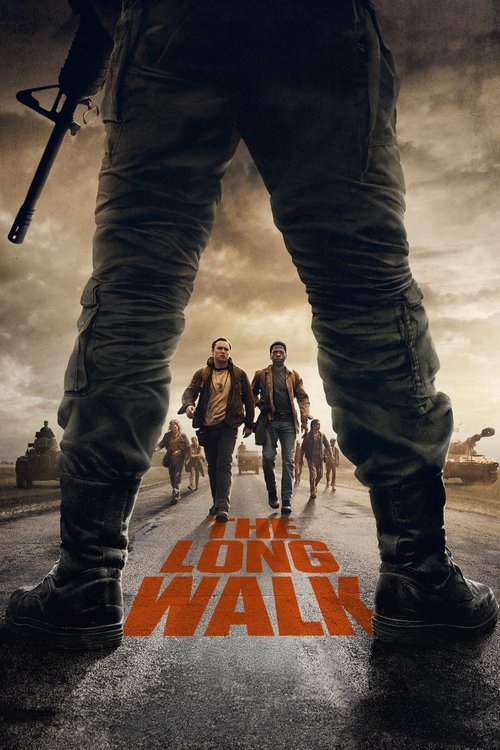
The Long Walk
In a dystopian, alternate-America ruled by a totalitarian regime, 50 teenage boys take part in a deadly annual walking contest, forced to maintain a minimum pace or be executed, until only one survivor remains.
Genres
Languages
Production Companies
Lionsgate, about:blank, Vertigo Entertainment, Media Capital Technologies
Budget
$20,000,000
Top Cast
Fan Reviews
Director Francis Lawrence’s screen adaptation of Stephen King’s novel by the same name is one of those pictures that makes me want to stand up in the theater and exclaim that the Emperor is indeed naked (though I’d probably be quickly escorted from the moviehouse if I did so). The source material for this production, originally written at the time of the Vietnam War, was an allegory about the draft and its impact on young American men at the time, a mandate that often led to their deaths in an unpopular and largely unexplained conflict. And it’s a statement that’s admittedly still valid (albeit perhaps not as relevant) all these many years later. However, the story’s translation from book to screen in the present day leaves much to be desired, in part because its message isn’t as timely as when the book was written and in part because of the film’s stunningly poor execution. “The Long Walk” tells the tale of a feebly justified (and even more poorly explained) grim ritual in which 50 young men selected from a nationwide lottery embark on a nonstop march in which they must maintain a minimum 3 mph walking speed. Their determined efforts in this symbolic venture are supposedly intended to inspire the population to become more productive citizens in a dystopian version of America as it recovers from a great war. But those who fail to sustain their pace are mercilessly gunned down after three warnings (and who said cold-blooded killing isn’t motivational?). The last man standing in this open-ended competition is named the “winner,” an accomplishment that entitles him to whatever he wishes as a reward. Symbolism and literary surrealism aside, however, the premise behind this work is utterly absurd, especially since participation in the march is voluntary, a betrayal of one of the principal thematic elements of the source material in allegorically criticizing an underlying inhumane mandate. Given that, then, who in their right mind would sign up for something like this? But, beyond the inherent lunacy of its premise (not to mention its contradictory and countless logically implausible plot elements), the picture fails as a well-crafted, engaging work of cinema. To begin with, it commits the cardinal moviemaking sin of predictability, its narrative events and ultimate outcome largely visible from miles away. Next, its storyline quickly becomes tediously repetitive with only minor deviations in plot devices along the way. Its billing as a horror flick is seriously misplaced, as it’s not particularly scary – just gratuitously gross whose shock value impact and multiple disgusting references to bodily functions fade rapidly by going to the same tiresome well far too many times. And, on top of all that, it’s often terribly boring, loaded with protracted conversations among bland, monodimensional characters that just aren’t especially compelling or profound. The screenplay driving all this appears to draw its inspiration from the narratives in pictures like “Platoon” (1986) and any number of classic World War II buddy films but with less articulate and attention-holding writing. To its credit, the film valiantly attempts to infuse the story with insights related to contemporary social and political issues, though these efforts sadly remain largely underdeveloped. What’s more, there are missed opportunities here, too, such as the picture’s failure to make a definitive statement about the bloodsport nature of the event given its popularity with a rapt, admiring and inexplicably reverential public that’s able to watch the entire spectacle via a live video feed. When all of these elements (or should I say shortcomings?) are combined, you’ve got one ridiculously hot cinematic mess (handily one of the worst releases of 2025), one that probably would have been more aptly titled “Roadkill.” I find it puzzling that this offering from the director of four of the five “Hunger Games” franchise releases was unable to work his magic once again in this release in light of the similar nature of this project. However, in my view, this production misses the mark by such a wide margin that, if the sharp-shooters in this story had an aim comparable to that of the director, no one would have died by the time the closing credits roll. But, then, maybe we would have been better off with a picture that produced such an outcome, given that there’s little redeeming entertainment, enlightenment or educational value in this cinematic debacle. And, no matter what anyone might say, in the end, the Emperor is still naked.
This review contains spoilers.
Take a road, a few military props and a small group of young actors and you have the essentials of "The Long Walk".
Initially, I though this had something of the “Hunger Games” to it, as a group of fifty young men assemble at a military roadblock. It appears they have each won a lottery and a prize of untold riches awaits the winner of a walking competition. The rules are simple. Keep above 3 m.p.h. and don’t stop. “Ray” (Cooper Hoffman) pays an emotion farewell to his mum and joins a group of lads that includes “Pete” (David Jonsson); the somewhat odious “Barkovitch” (Charlie Plummer), talkative “Olson” (Ben Wang) and the lithe and fit looking “Stebbins” (Garrett Wareing) and “Art” (Tut Nyuot). A rousing speech from the “Major” (Mark Hamill) explains the rules to them, and makes clear that it will quite literally be the last man standing who wins. Quickly, “Ray” and “Pete” bond and as they set off, we discover more about what makes these two men tick, interspersed with some lively contributions from their fellow walkers who manage to engage, irritate, offend and motivate as the miles accrue and the numbers dwindle. This takes a fairly intense look at the processes of male bonding and both Hoffman and Jonsson deliver powerfully compelling performances as both characters come to terms with an unpleasant inevitability as hunger and sleep deprivation take their toll. Both Wang and Plummer also deliver unexpectedly charismatic efforts here: a far cry from anything I’ve seen either do before, and though he’s not on screen often, Hamill also manages to exude a degree of malevolent megalomania as this effort to reenergise the not so industrious youth of America travels the country. I felt that it built well to a poignant denouement, but at the moment of truth it rather lost it’s potency and I think it caved in a bit. Still, there is an intensity, a warmth and some vulnerability on show here as both physical and mental endurance are tested to the limits whilst wrapped in a coat of guilt, ambition and increasing inter-reliance. It’s not an easy watch, but as a (less brutal) allegory for so much of modern day, dog-eat-dog life, it works really quite powerfully.









